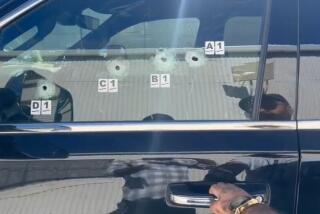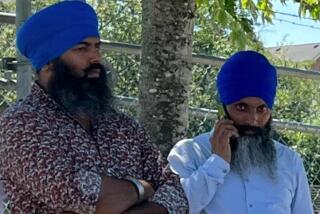Bombs Kill 30 as India’s Sikh Crisis Flares Again
- Share via
NEW DELHI — Sikh terrorists bombed buses and trains carrying Hindu passengers here and in adjacent northern India states Friday, killing more than 30 people and injuring at least 100 in what appeared to be a well-organized campaign of revenge for the slayings of hundreds of Sikhs after last year’s assassination of Indira Gandhi.
The United News of India reported more than 30 dead after major terrorist incidents in New Delhi and in neighboring Haryana and Uttar Pradesh states. The rival Press Trust of India reported at least 40 dead in attacks that the police immediately blamed on Sikh terrorists, including several who left explosive-packed transistor radios on bus seats and in train compartments.
Prime Minister Rajiv Gandhi, after late night strategy sessions with aides, ordered the Indian Army placed on alert in the most serious escalation of Sikh terrorist activity since the army stormed the Golden Temple at Amritsar last June to drive out Sikh extremists.
At Sensitive Moment
The attacks came on the anniversary of the Indian Mutiny of 1857, a key moment in the Indian nationalist movement against the British, when Hindu and Muslim soldiers staged a bloody rebellion that was eventually quelled by the British with the help of the Sikhs. Sikh collaboration with the British has long been a sore point with nationalists, although Sikhs later became instrumental in the nationalist movement.
The bombings Friday could not have come at a more sensitive moment in the continuing crisis involving Sikhs in agriculturally rich Punjab state, where the major
ity of India’s 15 million Sikhs live. Sikh leaders have been involved in tense exchanges with the central government of Prime Minister Gandhi.
Last month, Gandhi made a series of conciliatory gestures aimed at placating the Sikh leaders, including ordering a judicial inquiry into the killings of at least 1,000 Sikhs after the Oct. 31 assassination of his mother.
Efforts to resolve the Punjab crisis politically have been fiercely opposed by fundamentalist Sikhs who seek a separate state, Khalistan, for the Sikh people. Recent weeks have been marked by mounting violence.
Sikhs Promised Revenge
Most of the incidents Friday occurred outside Punjab, a fact that police said suggested revenge long promised by militant Sikhs against Hindus in New Delhi and other Hindu-dominated states in northern India.
The first terrorist attack, however, was in Punjab. Sikh gunmen riding on scooters shot and killed a prominent Hindu political leader, Balbir Singh, president of the Punjab Lok Dal Party and a strong promoter of Hindu-Sikh unity. The Sikh terrorists often have singled out moderate leaders in both the Sikh and Hindu ranks as victims.
After the killing of Balbir Singh near his farm on the outskirts of the north Punjab city of Hoshiarpur, several hundred of his Hindu followers stormed the town, burning Sikh businesses and killing at least one person. Singh’s cremation there today threatens to be the site of more violence as alienation between Hindus and Sikhs, for centuries linked by intermarriage and religious custom, increases.
Bombs in Bus Terminal
The episode here in New Delhi, in which at least 13 were killed as eight bombs exploded in a two-hour period, was by far the worst single episode of Sikh separatist violence in the capital. The bomb attack Friday centered on the interstate bus terminal in the old section of the city.
The first explosion was on a bus bound for Muzzafarnagar in the Hindu area of Uttar Pradesh, followed in rapid succession by seven other blasts, eyewitnesses reported. Three buses were destroyed by bombs on the grounds of the modern bus terminal, and the windows of several more were shattered.
Indian Express news photographer R. K. Sharma said he was riding on his scooter with his wife following a Delhi transport bus when an explosion rocked the vehicle.
“People were panic stricken. For two or three minutes no one came close to the bus. Then we saw blood flowing down the steps.”
Unlike the period following the assassination of Indira Gandhi, when Indian news organizations did not identify victims or attackers as Sikhs or Hindus, this morning’s editions of Indian newspapers here openly identified the attackers as “Sikh terorists.”
The Times of India newspaper reported that presentations at several theaters were canceled and that bus routes were curtailed in the capital following the bombings.
Outside New Delhi, meanwhile, as many as 10 people were killed in the Punjab-Haryana capital of Chandigarh, which is located on neutral ground between the two states. Hand grenade and bomb blasts rocked three buses and another explosion killed four people at a main bus stand.
In Uttar Pradesh six more people were killed in a crowded express train compartment near Meerut by a bomb timed to detonate just as the train entered the station, 40 miles northeast of New Delhi.
Roadblocks were set up Friday night on all roads leading out of New Delhi.
More to Read
Sign up for Essential California
The most important California stories and recommendations in your inbox every morning.
You may occasionally receive promotional content from the Los Angeles Times.










